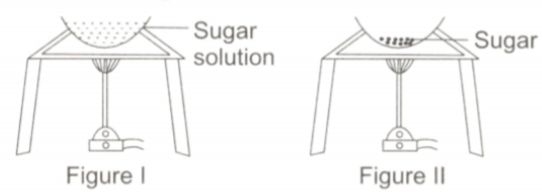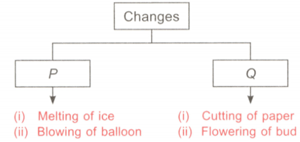Anil Ahlawat Solutions for Chapter: Changes Around Us, Exercise 1: EXERCISES
Anil Ahlawat Science Solutions for Exercise - Anil Ahlawat Solutions for Chapter: Changes Around Us, Exercise 1: EXERCISES
Attempt the free practice questions on Chapter 4: Changes Around Us, Exercise 1: EXERCISES with hints and solutions to strengthen your understanding. NSO Science Olympiad Workbook Grade 6 solutions are prepared by Experienced Embibe Experts.
Questions from Anil Ahlawat Solutions for Chapter: Changes Around Us, Exercise 1: EXERCISES with Hints & Solutions
Nitu mixed some iron filings with sulphur powder in a China dish. She heated the contents of China dish. What did she observe during the experiment?
What is common among the following phenomena?
1. Blinking of traffic lights
2. Rotation of blades of a fan
3. Swinging of pendulum of a clock.
Observe the two figures given below. In figure , a solution of sugar in water is heated and in figure , only sugar is being heated. What changes are taking place in both figures and ?

Rohan tore a sheet of paper into pieces and then burnt them. Identify the irreversible change taking place in the process.
Study the given flow chart carefully.

Which of the following is correct?
| P | Q | |
|---|---|---|
| (A) | Reversible Change | Reversible Change |
| (B) | Irreversible Change | Reversible Change |
| (C) | Irreversible Change | Irreversible Change |
| (D) | Reversible Change | Irreversible Change |
A potter shapes pots out of clay (Process ). He then bakes the pots in an oven (Process ). Which of the following statements is correct?
Match column with column and select the correct option from the given codes.
| Column | Column | ||
|---|---|---|---|
| P. | Digestion of food in our body | (i) | Fast change |
| Q. | Earthquake | (ii) | Natural, desirable change |
| R. | Falling of stone | (iii) | Natural, undesirable change |
| S. | Change of seasons | (iv) | Slow change |
Consider the following phenomena :
(i) Forest fire
(ii) Growth of plants
(iii) Low and high tides
(iv) Occurrence of a rainbow
(v) Earthquakes
(vi) Opening of a morning glory flower
Which of the above phenomena can be classified as periodic changes?
